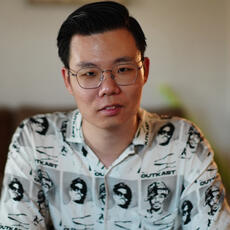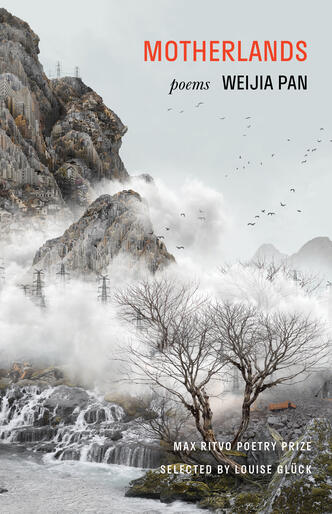Poetry: A Global Enterprise
Weijia Pan’s debut collection of poems, Motherlands, was selected by the late Louise Glück as the winner of the Max Ritvo Poetry Prize in 2024. Among other things, the book is a transnational exploration of personal, familial, and cultural trauma, as well as the more universal trauma of the COVID-19 pandemic. Pan’s poetry draws on countless juxtapositions (of two countries, two languages, past and present, and national loyalty versus personal transparency), questioning “home,” nostalgia, and self-exile in order to express himself through the lens of a dual citizen. In the following interview conducted by Milkweed Editions, Pan opens up about the impetus behind his politically and nationally concerned debut collection, and reflects on all the dualities abounding within it.
Milkweed Staff: When did the poems in Motherlands, first start coming into being?
Weijia Pan: Motherlands is a book that looks back, in retrospect, at my personal and family experiences. While most of the poems were written between 2021 and 2023, the initial ideas can be traced back to the alleys of Nanjing and Shanghai—cities where I grew up—and to earlier conversations with my family. I didn’t start until after COVID-19 hit, when my parents were under lockdown in Shanghai, and I was studying creative writing at the University of Houston. It was a time of crisis, and I regretted not staying home with them. As a poet, however, I could at least document my thoughts in verse. Thus began the first poems in Motherlands.
MS: You mentioned having published poems and short stories in Chinese from as far back as high school. What prompted your decision to shift into writing poems primarily in English?
WP: In poetry, I discovered a way to write about contemporary China, a socialist country with capitalist characteristics. I began, like many other young poets, by emulating the Misty and post-Misty poets such as Bei Dao, Gu Cheng, Xi Chuan, and Hai Zi, and through them, Lorca, Trakl, Celan, Tranströmer, etc. Classical Chinese poetry was also a major influence.
Because these poets offered me the initial education, I didn’t find the transition to English too difficult.
I began to see writing in English as a valuable challenge that would help me approach my usual topics from a new set of angles. It allowed me to investigate Chineseness from the outside, in the context of worsening US–China relations.
MS: Does your composition process differ when writing poems in different languages?
WP: When I write, I often notice a lot of border crossing between languages. An idea appears, sometimes in Chinese, sometimes in English. Sometimes a Chinese idea works better in English, or vice versa, or they work hand in hand in a poem that code-switches. Writing is a polyphonic process, and I don’t limit myself to one language. Revision is the more difficult part, but there’s relief in knowing that it bothers every writer.
MS: Do you feel your poems achieve different things depending on their language of origin?
WP: Yes, which I think has to do with the fact that Chinese and English poetry come from very different traditions.
When I write in Chinese, I look at what other poets are writing and see if I can add to or challenge their work. When I write in English, I respond to my identity as a Chinese poet writing in the US and contextualize personal and family experiences by referring to historical and political events. These are two very different environments in which my methods and goals vary.
MS: Have you ever considered translating your own work across languages?
WP: I’ve attempted it in both directions and found the results beneficial to my writing, but I haven’t thought about publishing my Chinese poems in English yet. In my capacity as a translator, I want to focus on serving the Chinese poets that I admire. I am currently working on an anthology of contemporary Chinese poetry to highlight their work and to introduce ongoing discussions in Chinese poetry about culture, identity, and politics into English.
MS: In the cases of writing about real figures in your life and writing about the two politically oppositional countries you’ve lived and studied in, did you grapple with conflicting ideas of loyalty, identity, or consequence in your initial writing process? If so, how did you work to overcome them?
WP: Yes and no. I used to find myself in a dilemma when I sacrificed historical accuracy for better imagery or narrative. It stemmed partly from my attention to historical authenticity, which I held as a standard for artistic creation. But I also knew that history is historiography and that it’s a historian’s job to piece together discrete fragments—and that a poem serves its purpose by being an excellent poem and documenting the zeitgeist.
On the other hand, I didn’t find myself in a dilemma when dealing with two politically oppositional countries. The fact is: I’m loyal to neither. Instead, I see myself as a global citizen capable of criticizing anything that I find wrong. This position, I hope, will allow me to escape the duality of either looking at China from a Western perspective or vice versa—which I find to be the ultimate limitation of the writer-in-exile—and focus more on regional problems with global ramifications.
MS: What are some of the largest questions you pondered in the composition of Motherlands that you hope readers of the collection will similarly come away with?
WP:There were so many things on my mind when I wrote this book, including, but not limited to, personal and family traumas, anti-Asian hatred in the US, displacement and separation as regional and global phenomena, and the tension between traditional values and modern societies. But I want my readers to still feel the joy of reading poetry and think of poetry as being crafted by poets who eagerly study the works of others, adding to and innovating a tradition that spans thousands of years. I also want my readers to realize that poetry is a global enterprise that defies cultural and linguistic boundaries. I hope my book will make this world slightly bigger and attract more people who might find poetry interesting for their own creative expression.
If readers are still with me, here’s something they can do:
1. Buy my book (thank you!)
2. Support poetry collections and anthologies translated from other languages (Milkweed has an excellent list, including Tomaž Šalamun’s Kiss the Eyes of Peace and Maya Abu Al-Hayyat’s You Can Be the Last Leaf. I’d also recommend Arthur Sze’s The Silk Dragon II and Michelle Yeh et al.’s A Century of Modern Chinese Poetry: An Anthology.)
3. Pick up a new language, if they have the time, to enjoy their favorite poets in the original. Trust me—this is easier than it sounds. By doing this, readers can also immerse themselves in a different culture.

